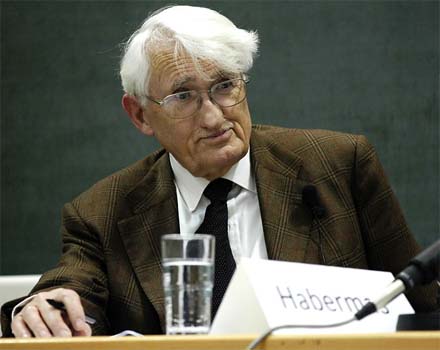Habermas, Germany's greatest living philosopher, turns 80
 Berlin - German philosopher Juergen Habermas, who turns 80 on Thursday, is not one to shy away from topical debate.
Berlin - German philosopher Juergen Habermas, who turns 80 on Thursday, is not one to shy away from topical debate.
Considered Germany's greatest living philosopher, Habermas recently pointed his finger at the politicians who, he said, had done nothing to prevent the financial crisis.
"Politics ridicules itself if it moralizes, instead of basing itself on the coercive right of the democratic lawmaker," said the philosopher and political sociologist, who received worldwide acclaim for his critical theory of rationality.
The works of Habermas examine the concept of the public sphere, asking which is the best form of "discourse" to organise a democratic society.
Habermas' political analysis has enduringly shaped Germany's intellectual climate, since he first published The Structural Transformation of the Public Sphere in 1962.
The philosopher's understanding of democracy as a process based on communication influenced Germany's 1968 student revolt.
Habermas hasn't limited his critical thinking to Germany.
He is a strong proponent of the European Union (EU), believing citizens should be given a chance to participate in a referendum on the EU's future.
"In most countries of the continent there are sleeping majorities in favour of further consolidation of the EU," Habermas said in 2007.
The political scientist has been internationally prominent in public discourse, notably criticizing former US President George W. Bush for his policies on Iraq.
By ignoring the fundamental values of America's own political tradition, Habermas said, Bush had made the world "less safe." However he has always stressed that his criticism "doesn't have the slightest overtone of anti-American sentiment."
Western and Islamic leaders have paid attention to Habermas' views on the role of religion and state.
"Tolerance and the separation of state and religious power certainly demand an act of adjustment by the large religious communities," Habermas said.
The philosopher said Islam had enough vitality to tackle this challenge, but warned, "any intercultural dialogue is futile if it comes without the clear willingness to bring political justice to the globalized economy."
Habermas was born in Duesseldorf, Germany on June 18, 1929 and studied philosophy, psychology, German literature, and economics in Goettingen, Zurich and Bonn.
In the 1950 he joined Theodor W. Adorno's renowned Institute for Social Research in Frankfurt and later taught at the universities of Marburg, Frankfurt and at the Max-Planck Institute in Starnberg, before returning to Frankfurt as professor for philosophy.
In his key work, Theory of Communicative Action (1981), Habermas said citizens had become increasingly removed from public society, as developments such as mass consumption and specialized interest groups replaced political activity on the individual level.
In the 1980s, Habermas became embroiled in the so-called Historians' Quarrel, criticizing prominent historians for what he considered to be an "apologist" description of Nazi Germany.
In 2006 however, Habermas himself came under fire for his own role in the Nazi era, as allegations surfaced regarding his role in the Hitler Youth movement. Habermas was aged 15 at the end of World War II.
Habermas' contribution to political and intellectual debate has won him an array of international acclamations, including the peace prize of the German Book Trade, Japan's Kyoto Prize in Art and Philosophy and the Norwegian Holberg Prize. (dpa)